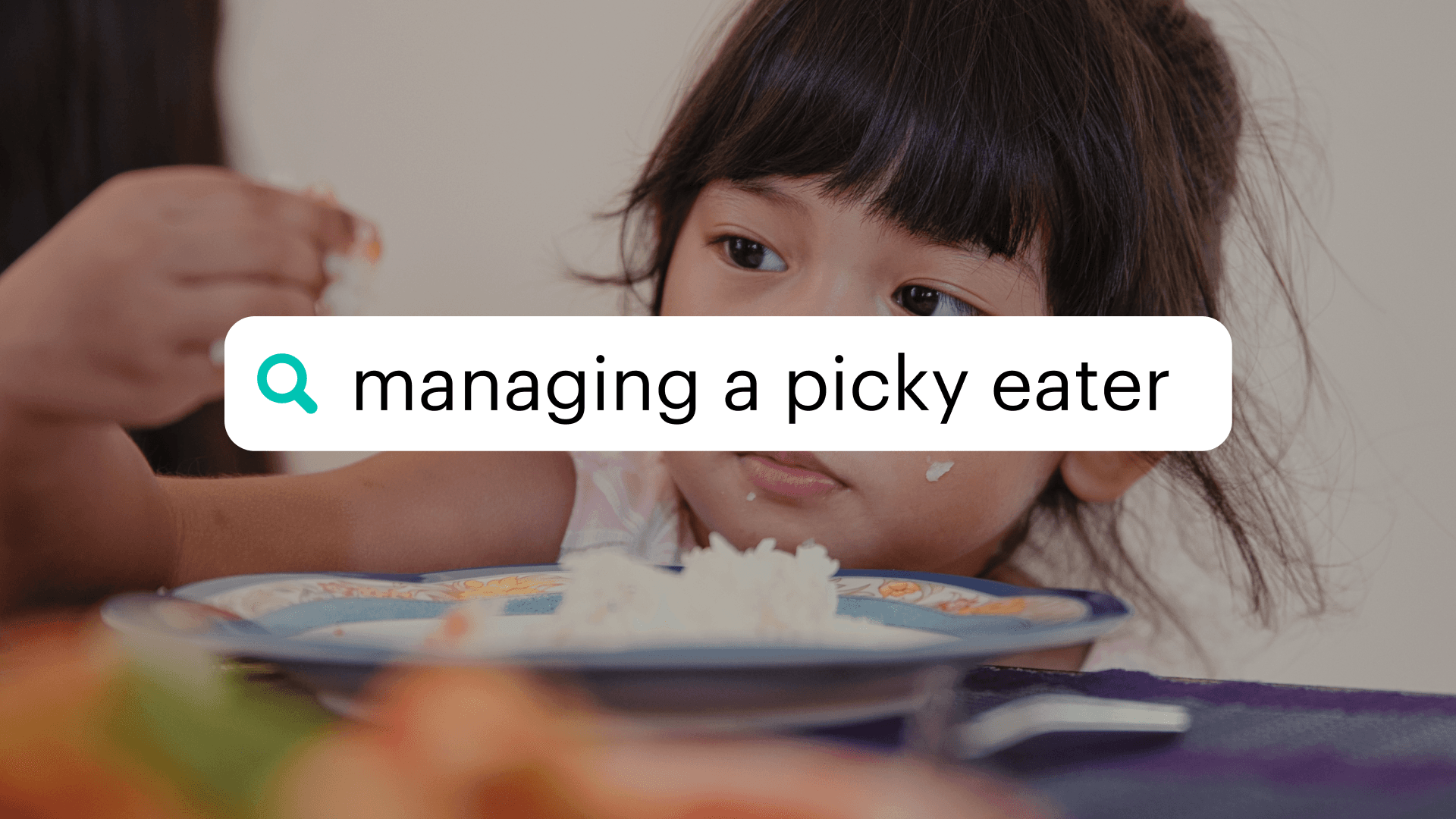we have to talk about

The latest in parenting news, tips, and trends:
The right time to share your body issues with your child, according to experts. Plus, how to do it delicately.
The surprising advice one nurse recommends parents do during playtime to help their kids prevent injury. Sit back, relax.
How one millennial Black mother is re-examining her relationship with anger—and teaching her daughter why sometimes you need it.
Why kids tend to be closer to their mom’s side of the family, according to researchers. It’s called the “matrilineal advantage.”
How Netflix’s new show “Spirit Rangers” is based on Native characters and written by an all-Native writers' room. It'll bring joy to kids of all ages.
tell me what to do

Q: My kid is a picky eater, what can I do to encourage them to eat a variety of foods?
First, know that you’re not alone and you have not failed your child, says Jennifer Anderson, a registered dietitian and founder of Kids Eat in Color. There isn’t an official definition for picky eating, but food neophobia (unwillingness to try new foods) is common. Research shows about 40-60% of kids experience it. The good news? Picky eating in school-aged kids tends to be less common after 6, but that can always change.
Rather than stressing about doing everything “right,” focus on one thing at a time to make mealtime less stressful. Here are some ways to manage picky eating:
Stick to your menu: You set the menu, and they decide how much of it they want to eat. Don’t make them another meal, but do include foods you know your child likes.
Don’t pressure your child: The goal is to create a pleasant and inviting eating environment for your kid. Try to stay away from saying things like "You can have dessert if you eat your broccoli." Remember: Food shouldn't be used as a reward for behaviors, finishing meals, or eating veggies.
Create a routine: Have a set schedule so your kid knows when food is coming. Letting a picky kid eat freely throughout the day can backfire since they are less likely to feel hungry and therefore much less willing to try new food.
Be consistent: Keep serving food you’d like your child to eat regularly so they can become more comfortable with them. Use the same designated eating place (like a high chair) and try to keep the area as distraction-free as possible (ideally that means no TV).
Model the behavior you want to see: Eat the foods you’d like your child to eat. If there’s something you’re not a fan of, try it in front of your kid. You can say, “I’m learning to like this food. Maybe I’ll try more another day.”
Plan for social gatherings: If your kid experiences social stress as a result of picky eating, help them make sure they have food they’ll enjoy at social events.
Note: If you notice that your child is becoming pickier and the list of foods they’ll eat is getting smaller, it may be time for more support. And of course, when in doubt, ask your pediatrician for advice.
tell us
Do you have a parenting question you want answered by an expert? Ask anonymously here. Your question could be answered in next week's email.
self-help
For When You Need a Laugh
Online parenting content can feel exhausting, stressful, and at times, unrealistic. Where are the messy homes? Or real talk about the frustrations of being a parent? Enter: This list you didn't know you needed. These moms and dads share relatable takes on parenting while also making us laugh:
Caitlin Murray (@bigtimeadulting): Caitlin has three school-aged kids and always tells it like it is. She’s got a matter-of-fact delivery when talking about parenting struggles — whether it’s venting about dinnertime, dealing with family lice, or the latest unrealistic parenting trends.
Tushita (@tushita.h): Tushita posts relatable reels about vacationing with a baby, messing with her husband, and dealing with the haters. She also pokes fun at "life hacks" with her hilarious takes.
The Dumb Dads (@thedumbdads): Evan Berger and Kevin Laferriere are comedians and stay-at-home dads of young kids who make fun of themselves and their “dad fails.'' Check out their dad press conferences or dumb dad hotline.
Linda Fruits (@fruitsofmotherhood): Linda co-parents her two kids with her ex-husband, who is also the sperm donor for the baby (born Wednesday) she’s raising with her girlfriend. And while navigating her day-to-day life, she posts funny, honest, and personal content about her journey.
Taylor Wolfe (@thedailytay): Taylor shares relatable reels about what life is like as a mom vs. before kids, weird toddler things, and her relationship. She pokes fun at influencers, her mom, and those infamous Facebook mom groups.
research says

Kids Raised by Same-Sex Parents Develop the Same If Not Better
New research suggests children with gay, lesbian, transgender, or other “sexual minority” parents fare as well as, or better than, kids with heterosexual parents. Meaning: Parents’ sexual orientation doesn’t impact their kids’ development. “Sexual minority” includes lesbian, gay, bisexual, transgender, queer, gender non-conforming people and others whose sexual or gender identities are considered outside social and cultural norms.
Researchers from the US and China analyzed data from 34 studies in countries where same-sex relationships are legal. They found kids younger than 6 raised by LGBTQIA+ had fewer psychological problems. The study also suggested that same-sex parents have better child-parent relationships than those raised by their heterosexual peers and that growing up with LGBTQIA+ parents may offer some advantages, like being more tolerant of diversity and more nurturing toward younger children.
The study did note that there are risks associated with being part of a sexual minority family, such as social stigma and discrimination, and lack of social support — which could impact health and well-being. Researchers called on policymakers to give families more legal protections, social support, and access to resources in communities and schools.
relatable
“Not to brag but I’m an expert at using laundry to accessorize the living room.”
– @moonstruckinnyc on Twitter. It’s art.
Live Smarter
Sign up for the Daily Skimm email newsletter. Delivered to your inbox every morning and prepares you for your day in minutes.